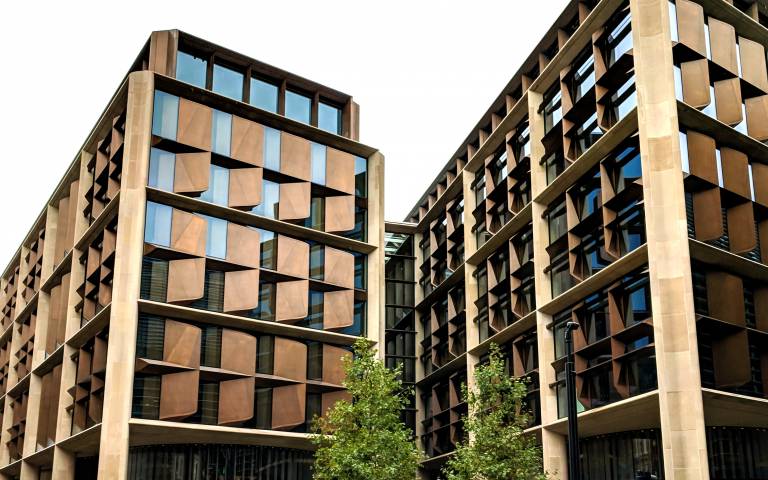Life cycle assessment and circular economy

Life Cycle Analysis (LCA) is a procedure for estimating the environmental performance of products and processes throughout their lives. When applied to buildings, instead of focusing on environmental impact only once buildings are built and occupied, LCA looks at environmental impacts in processes from other stages in buildings life cycle: impacts from the production of building materials, transport & construction (embodied carbon), operation, repair, maintenance & refurbishment (operational carbon) and demolition (end of Life).
Circular Economy looks at ways building components can be used once buildings reaches their end of life, in an attempt to find mechanisms for re-using construction elements & materials.
Our work on buildings LCA relies on a mixture of research methods and tools. Our research ranges from embodied carbon analysis and life-cycle performance optimisation, through analysis of refurbishment & replacement to life-cycle-based stock modelling. Our work is often carried out in collaboration with policy makers and experts from practice, to assist stakeholders across the built environment.
Jump to: Research areas | Recent Projects | In teaching | Researchers
Research areas
Buildings Life Cycle Assessment (LCA)

Buildings embodied carbon analysis

Embodied carbon ‘performance gap’

Life cycle stock-modelling

Recent projects
- ‘Looking after what we’ve got - the state of the art of Carbon Footprint', The National Trust.
- 'Embodied Carbon Calculator (H\B:ERT)'
- 'Delivering Net Zero In Use - a KTP with AHMM'
Life Cycle Assessment and Circular Economy in teaching
The Life Cycle Assessment and Circular Economy MSc is embedded in our teaching at the UCL Institute for Environmental Design and Engineering. Researchers from our theme contribute to the teaching of our MSc programmes and supervise dissertations for students who wish to undertake their own research in the area of life cycle assessment and circular economy.
Environmental Design and Engineering MSc

Here are some examples of past dissertations we have supervised focused on the state of the art of Life Cycle Performance and Embodied Carbon:
- The design-stage embodied carbon performance gap through the RIBA stages
- The life cycle impact of refurbishment packages on residential buildings with different initial thermal conditions
- The rise of the Second Performance Gap? Investigating the Discrepancies between predicted and actual Embodied Carbon using A case study building
Engineering & Architectural Design MEng

Engineering and Architectural Design MEng has been designed in close collaboration with industry leaders, to combine the major disciplines of architecture and engineering of the built environment and prepare graduates to be future industry leaders. The programme is run jointly with the Bartlett School of Architecture and the UCL Department of Civil, Environmental and Geomatic Engineering.
For the MEng students, Net Zero design is an integral part of the Design Practice studio work. Embodied Carbon calculations are covered in the ‘Making Buildings’ module, where students are asked to calculate the embodied carbon of a selected space and propose a more efficient design.
Doctoral Research (PhD)
Life Cycle Analysis is integrated into several PhD research projects.
Doctoral research relating to life cycle assessment and circular economy:
- Simon Vakeva-Baird: Combining building dynamic simulation with multi-criteria decision-making methods for a participatory design framework for net-zero carbon buildings
- Kubra Doguc: Optimizing life cycle performance of hospital building refurbishment through low carbon measures
- Amr Hamada: Retrofit Strategies for Public Administrative Buildings in Egypt
- Sahar Nava: A Participatory Life Cycle Sustainability Assessment Framework for the Appraisal of Estates’ Regeneration Schemes in London
- Dolapo Oluteye: Discovering workingscapes: Why and how hotel lobbies are transforming into workplaces for the modern worker
- Fady Abdelaziz: An assessment framework for the energy efficiency upgrade of the new cities housing stock in Egypt: A multi-objective optimisation approach
- Seyma Atik: Investigating the effectiveness of implementing LCA-based BIM plugins in early-stage building envelope design
- Eleni Davidson: Towards a probabilistic, life-cycle approach to inform climate change adaptation strategies for urban higher education building design
- Reham Alasmar: Estimating the Whole Life Cycle Carbon of Jordanian Housing Stock through Refurbishment Strategies Toward Net Zero Carbon.
Researchers
Dr Esfandiar Burman
Associate Professor
esfand.burman@ucl.ac.uk
Dr Rokia Raslan
Associate Professor
r.raslan@ucl.ac.uk
Prof Ben Croxford
Professor of Environmental Design and Engineering
b.croxford@ucl.ac.uk
Dr Yair Schwartz
Lecturer in Engineering and Architectural Design
yair.schwartz@ucl.ac.uk
 Close
Close

